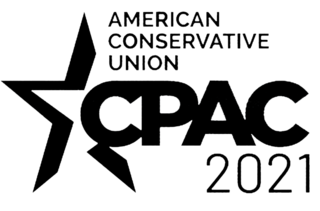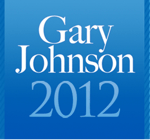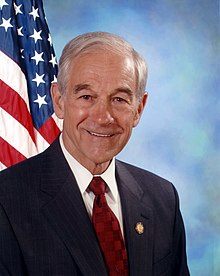
Ronald Ernest Paul is an American author, activist, physician and retired politician who served as the U.S. representative for Texas's 22nd congressional district from 1976 to 1977 and again from 1979 to 1985, as well as for Texas's 14th congressional district from 1997 to 2013. On three occasions, he sought the presidency of the United States: as the Libertarian Party nominee in 1988 and as a candidate for the Republican Party in 2008 and 2012. A self-described constitutionalist, Paul is a critic of the federal government's fiscal policies, especially the existence of the Federal Reserve and the tax policy, as well as the military–industrial complex, the war on drugs, and the war on terror. He has also been a vocal critic of mass surveillance policies such as the USA PATRIOT Act and the NSA surveillance programs. In 1976, Paul formed the Foundation for Rational Economics and Education (FREE), and in 1985 was named the first chairman of the conservative PAC Citizens for a Sound Economy, both free-market groups focused on limited government. He has been characterized as the "intellectual godfather" of the Tea Party movement, a fiscally conservative political movement started in 2009 that is largely against most matters of interventionism.

The Conservative Political Action Conference is an annual political conference attended by conservative activists and elected officials from across the United States and beyond. CPAC is hosted by the American Conservative Union (ACU). The first CPAC took place in 1974.
The following is a timeline of major events leading up to and immediately following the United States presidential election of 2008. The election was the 56th quadrennial United States presidential election. It was held on November 4, 2008, but its significant events and background date back to about 2002. The Democratic Party nominee, Senator Barack Obama of Illinois, defeated the Republican Party's nominee, Senator John McCain of Arizona.

The 2008 Iowa Republican presidential caucuses took place on January 3, 2008. The Iowa Republican caucuses are an unofficial primary, with the delegates to the state convention selected proportionally via a straw poll. The Iowa caucuses mark the traditional formal start of the delegate selection process for the 2008 United States presidential election.

The 2008 presidential campaign of Ron Paul, Congressman of Texas, began in early 2007 when he announced his candidacy for the 2008 Republican nomination for President of the United States. Initial opinion polls during the first three quarters of 2007 showed Paul consistently receiving support from 3% or less of those polled. In 2008, Paul's support among Republican voters remained in the single digits, and well behind front-runner John McCain.
The 2008 presidential campaign of Tom Tancredo, a Congressman from Colorado began on April 2, 2007 with a formal announcement. The campaign garnered grassroots support and endorsements from conservative Republicans concerned about illegal immigration and border security. However, Tancredo remained low in the polls and was criticized for his nativist campaign, which had been described as "single-issued." Tancredo stated that he probably would not win the nomination but hoped his campaign would bring forth more debate on his issue of concern, immigration. On December 20, 2007 Tancredo withdrew from the presidential race, and endorsed Mitt Romney.

The 2008 presidential campaign of Bob Barr, former Congressman of Georgia began on May 12, 2008. He announced his candidacy for the Libertarian Party's presidential after months of grassroots draft efforts. Barr was criticized by Libertarians who opposed his efforts in Congress, which included sponsorship of the Defense of Marriage Act and votes in favor of the USA PATRIOT Act and authorization of the War in Iraq, but he was supported by others who accepted his regret for those positions. Barr won the party's nomination after six rounds of balloting at the 2008 Libertarian Party National Convention. Former contender Wayne Allyn Root was named as his running mate. Reason magazine senior editor Radley Balko called Barr "the first serious candidate the LP has run since I've been eligible to vote."

The Chuck Baldwin presidential campaign of 2008 began April 10, 2008 as pastor and radio host Chuck Baldwin of Florida announced his candidacy for the Constitution Party presidential nomination. He previously served as the party's vice-presidential nominee in 2004. Baldwin's main opposition for the nomination was former ambassador Alan Keyes, who had just left the Republican Party. After a campaign touting his stands on civil liberties, foreign affairs, and religion, Baldwin won the nomination at the April 26 Constitution Party National Convention. Attorney Darrell Castle was selected as his running mate.

Electoral history of Ron Paul, Republican U.S. Representative from Texas, 1988 Libertarian Party Presidential nominee and candidate for the 2008 and 2012 Republican presidential nomination.
The following is a timeline of major events leading up to the United States presidential election of 2012. The election was the 57th quadrennial United States presidential election and was held on November 6, 2012.

The Ron Paul presidential campaign of 1988 began in early 1987 when former Congressman Ron Paul of Texas announced his candidacy for the 1988 presidential nomination of the Libertarian Party. He joined the third party after leaving the Republican Party over the Reagan administration's handling of the federal budget. He ran on a platform that included non-interventionism in foreign conflicts, decriminalization of illegal drugs on a federal level, a return to the gold standard, the abolition of the Federal Reserve and a reduction in all government spending.
The Values Voter Summit is an annual political conference held in Washington, D.C. for American social conservative activists and elected officials from across the United States.

The 2012 United States presidential election in Iowa took place on November 6, 2012, as part of the 2012 United States presidential election in which all 50 states plus the District of Columbia participated. Iowa voters chose six electors to represent them in the Electoral College via a popular vote pitting incumbent Democratic President Barack Obama and his running mate, Vice President Joe Biden, against Republican challenger and former Massachusetts Governor Mitt Romney and his running mate, Congressman Paul Ryan.

This is a list of straw polls that have been conducted relating to the 2012 Republican Party presidential primaries.

The 2012 presidential campaign of Ron Paul, U.S. Representative of Texas, began officially in 2011 when Paul announced his candidacy for the 2012 Republican Party nomination for the U.S. Presidency.

The 2012 presidential campaign of Gary Johnson, the 29th Governor of New Mexico, was announced on April 21, 2011. He declared his candidacy for the 2012 Republican Party nomination for President of the United States. On December 28, 2011, Johnson withdrew his candidacy for the Republican nomination, and declared his candidacy for the 2012 presidential nomination of the Libertarian Party. The 2012 Libertarian National Convention was held during the first weekend of May 2012. On May 5, 2012, after promoting his libertarian-oriented political positions to delegates, Johnson received the most votes at the convention and became the official 2012 Libertarian presidential nominee. On November 6, 2012, Johnson received just under 1% of the popular vote in the general election, amounting to more than 1.2 million votes, more than double what the Barr/Root ticket received in 2008. This was the most successful result for a third-party presidential candidacy since 2000, and the best in the Libertarian Party's history by vote number at the time. Johnson ran again in 2016 and received nearly four times his 2012 vote total.
The Southern Republican Leadership Conference (SRLC) is a political event held in the Southern United States before each presidential election. The event is attended by Republican Party activists, elected officials, and candidates for office. It has featured every major Republican presidential candidate since Ronald Reagan, and is best known for its presidential straw poll, which receives national media attention. In 2011, the event was dubbed the Republican Leadership Conference before restoring its original name for 2012.

The 2012 United States presidential election in Idaho took place on November 6, 2012, as part of the 2012 United States presidential election in which all 50 states plus the District of Columbia participated. Idaho voters chose four electors to represent them in the Electoral College via a popular vote pitting incumbent Democratic President Barack Obama and his running mate, Vice President Joe Biden, against Republican challenger and former Massachusetts Governor Mitt Romney and his running mate, Congressman Paul Ryan. Prior to the election, 17 news organizations considered this a state Romney would win, or otherwise considered as a safe red state. Romney and Ryan carried Idaho with 64.09% of the popular vote to Obama's and Biden's 32.40%, thus winning the state's four electoral votes. Romney's victory in Idaho made it his fourth strongest state in the 2012 election after Utah, Wyoming and Oklahoma. He improved on McCain's performance in 2008, expanding his margin from 25.3% to 31.69% and flipping Teton County which had previously voted for Obama.

The 2016 presidential campaign of Rand Paul, the junior United States senator from Kentucky, was announced on April 7, 2015 at an event at the Galt House in Louisville, Kentucky. First elected to the U.S. Senate in the 2010 election, Paul's candidacy for the Republican nomination for President of the United States in 2016 had been widely speculated since early 2013.

















